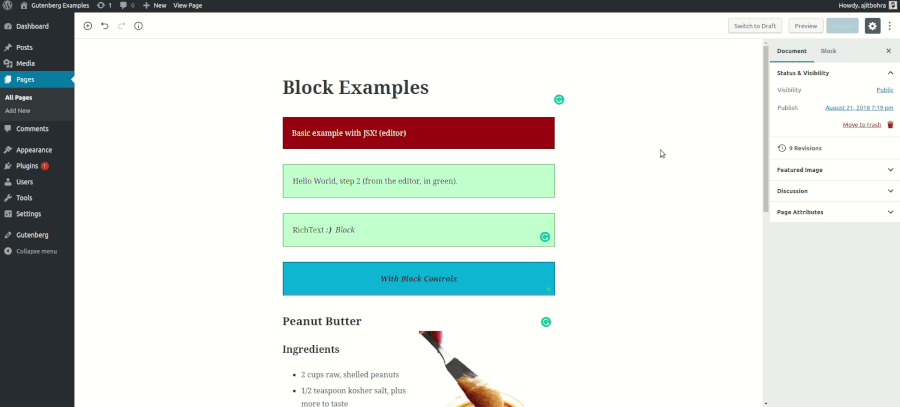Examples for extending Gutenberg with plugins which create blocks.
See also: Gutenberg developer documentation
Gutenberg Examples are distributed as WordPress plugin.
- Download the gutenberg-examples.zip archive of the latest release.
Do not download from the "Clone or download" GitHub button, as this includes the source material only. Read the Development instructions below if you’re interested in building your own copy of the plugin.
- Navigate to the Plugins > Add new screen in your WordPress administrative dashboard.
- Click Add New at the top of the page.
- Click Upload Plugin at the top of the page.
- Click Choose File, then find and Upload the downloaded zip file.
- After the plugin finishes installing, click Activate.
- You’re done!
This project uses the @wordpress/env package to provide a local development environment. Before you can use the development environment, you must install Docker.
Once Docker is installed, clone this project and enter the working directory:
git clone [email protected]:WordPress/gutenberg-examples.git
cd gutenberg-examples
Then, install the project dependencies:
npm install
Once installed, start the local WordPress instance with one of two commands:
npm run env:start- Starts the instance normally.npm run env:start:debug- Starts the instance with debugging enabled.
The WordPress instance will be available at http://localhost:8888/. You can login with the username and password "admin" and the password "password" at http://localhost:8888/wp-login.php. The plugin should be automatically activated.
To stop this local WordPress instance later run:
npm run env:stop
To install the node packages
npm install
This repository does not version the built files for any of the examples. You can build all of the examples by running npm run build:all in the project root.
In this repository, there are block and non-block examples and each have their own build process.
Block examples are stored in the blocks-jsx and blocks-non-jsx directories while and other non-block examples are stored in the non-block-examples directory.
Note: The blocks stored in blocks-non-jsx do not use JSX and therefore do not require a build process
-
npm run start- Builds development versions of the blocks and watches for changes to files to automatically rebuild as you develop. -
npm run build- Generates production files for the block examples. -
npm run start:non-block- Builds development versions of the non-block examples and watches for changes to files to automatically rebuild as you develop. -
npm run build:non-block- Generates production files for the non-block examples. -
npm run build:all- Generates production files for all examples


